Did you know that 70% of your immune system resides in your gut? A balanced gut microbiome plays a crucial role in defending against seasonal threats. Wellness Group specializes in natural solutions to help maintain this delicate balance.
Research shows that certain beneficial bacteria can reduce respiratory infections by up to 24%. By supporting gut health, individuals may enhance their body’s natural defenses. The right strains make all the difference.
Wellness Group offers science-backed guidance on selecting effective options. Their experts are available via WhatsApp at +60123822655 (Mon-Fri 9:30am-6:30pm, Sat-Sun 10am-5pm). A strong immune system starts with a thriving gut ecosystem.
Key Takeaways
- 70% of immune function is linked to gut health
- Targeted bacterial strains may lower infection risks
- Wellness Group provides personalized natural solutions
- Available for consultations via WhatsApp
- Business hours: Weekdays 9:30am-6:30pm, weekends 10am-5pm
Introduction to Probiotics and Immune Health
Modern science reveals fascinating connections between internal ecosystems and disease resistance. The right microbial allies can transform how the body responds to seasonal threats.
What Are Probiotics?

Click to LEARN MORE
These live microorganisms act as microscopic partners in digestion and protection. Found in supplements and fermented foods, they help maintain bacterial equilibrium in the gut.
Studies show specific strains strengthen the intestinal barrier against pathogens. This biological reinforcement may explain the 42% reduction in antibiotic use observed in regular consumers.
The Connection Between Gut Health and Immunity
Nearly three-quarters of immune cells reside in gut-associated lymphoid tissue (GALT). This system constantly communicates with beneficial bacteria to coordinate defenses.
When microbial balance shifts, immune responses may weaken. Research demonstrates how certain strains activate protective mechanisms in respiratory tissues.
For those seeking natural solutions, Wellness Group specializes in health benefits of probiotics through microbiome optimization. Their approach combines scientific rigor with personalized guidance.
Top Probiotic Strains for Fighting the Flu
Clinical research highlights specific strains that excel in supporting respiratory health. These microbial powerhouses work uniquely to strengthen defenses and reduce susceptibility to seasonal threats.

Lactobacillus rhamnosus GG: Immune Powerhouse
This strain is renowned for its impact on upper respiratory tract health. Studies show it reduces infections by 34% in children, likely by boosting IgA antibodies.
A Chr. Hansen study noted a 90% drop in throat infections among school-aged users. Its ability to disrupt pathogen biofilms makes it a frontline defender.
Bacillus coagulans Unique IS-2: Cold and Flu Defender
Spore-forming and resilient, this strain survives stomach acid to reach the gut intact. Research links it to a 34% shorter cold duration.
Unlike many strains, it’s shelf-stable—no refrigeration needed. Ideal for travelers or those with limited storage options.
Bifidobacterium lactis BB-12®: Elderly Immune Support
Aging immune systems benefit from BB-12®’s ability to enhance white blood cell activity. Trials show fewer sick days in older adults taking this strain.
It also supports gut barrier function, preventing harmful bacteria from entering the bloodstream.
| Strain | CFU Range | Storage | Key Benefit |
|---|---|---|---|
| L. rhamnosus GG | 5-10 billion | Refrigerated | Reduces throat infections |
| B. coagulans | 1-2 billion | Room temp | Cuts cold duration |
| BB-12® | 3-5 billion | Refrigerated | Boosts elderly immunity |
Wellness Group’s formulations combine these probiotic strains for targeted support. Their experts tailor recommendations based on individual needs and lifestyle factors.
Science-Backed Benefits of Probiotics for Flu Prevention
Scientific evidence continues to uncover how gut health influences seasonal illnesses. Targeted strains show remarkable potential in reducing susceptibility and severity of infections. Let’s explore the data.
Reducing Respiratory Infection Rates

Click to LEARN MORE
A meta-analysis of 6,950 participants revealed a 24% decrease in upper respiratory tract infections among those taking specific strains. Key mechanisms include:
- Cytokine regulation: Balancing immune signals to prevent overreaction to pathogens.
- Mucus membrane protection: Strengthening barriers in nasal and throat passages.
- Viral load reduction: Lowering detectable virus levels in clinical trials.
Shortening Illness Duration: What Studies Show
Shanghai researchers observed a 3-day shorter flu duration in groups consuming probiotic-rich yogurt. Age-specific findings:
- Children: 34% fewer sick days with L. rhamnosus GG.
- Adults: Fever duration dropped by 1.5 days on average.
- Elderly: Enhanced vaccine response when combined with BB-12®.
For those recovering from stomach flu, certain strains may accelerate gut repair. Wellness Group’s tailored recommendations align with these findings, offering personalized strategies for immune resilience.
How to Choose the Right Probiotic Supplement
Quality matters when picking microbial allies for immune resilience. With countless options available, understanding key features ensures optimal gut health support.

Key Features to Look For: CFUs and Strains
Colony-forming units (CFUs) measure live bacteria per dose. Research suggests at least 1 billion CFUs for noticeable effects, though studies often use 5–50 billion for immune benefits.
Strain specificity is equally critical. Look for labels listing full strain names (e.g., Lactobacillus rhamnosus GG), not just genus/species.
“Strain-designated supplements show 40% better adherence to label claims,” notes a 2023 Journal of Clinical Gastroenterology review.
Avoid sugar-coated gummies—high sugar content may counteract benefits. Instead, opt for enteric-coated capsules that survive stomach acid.
Storage and Viability: Keeping Probiotics Effective
Heat and moisture kill live bacteria. Check storage requirements—some strains need refrigeration, while spore-formers like Bacillus coagulans tolerate room temperature.
| Type | Storage | Viability | Best For |
|---|---|---|---|
| Refrigerated | 2–8°C | High potency | Long-term use |
| Shelf-stable | Below 25°C | Moderate | Travel |
Prebiotics like inulin boost probiotic effects by feeding beneficial bacteria. For those on antibiotics, take supplements 2–3 hours apart to minimize interference.
Wellness Group’s gut health support includes personalized storage guidelines to maximize shelf life and potency.
Easy Ways to Add Probiotics to Your Daily Routine
Boosting gut health doesn’t require drastic changes—simple dietary tweaks can make a big difference. Incorporating microbial allies into meals supports immunity and digestion effortlessly.
Probiotic-Rich Foods for Every Meal
Fermented foods like kimchi and kefir pack up to 10x more CFUs than supplements. Here’s how to enjoy them:
- Breakfast: Swap sugary yogurt for plain kefir smoothies with berries.
- Lunch: Add kimchi to rice bowls or sandwiches for a tangy crunch.
- Dinner: Top soups with miso paste or sauerkraut.
| Food | CFUs (per serving) | Key Strains | Tip |
|---|---|---|---|
| Kefir | 30–50 billion | Lactobacillus kefiri | Homemade has more diversity |
| Kimchi | 10–20 billion | Leuconostoc mesenteroides | Avoid heating above 40°C |
| Kombucha | 5–10 billion | Saccharomyces boulardii | Choose low-sugar options |
Timing and Dosage for Maximum Benefits
Take probiotics on an empty stomach for better absorption. Gut activity peaks in the morning, aligning with circadian rhythms.
Dosage varies by age:
- Adults: 5–50 billion CFUs daily.
- Children: 1–5 billion CFUs (consult a pediatrician).
For travel, opt for shelf-stable fermented foods like pickles or probiotic chocolate. Wellness Group’s meal planners help customize a gut-friendly diet.
Beyond Probiotics: Boosting Your Immune System Naturally
A strong immune system relies on more than just gut health. Daily habits and nutrient intake play equally vital roles in defending against seasonal threats. Simple lifestyle adjustments can create powerful protective effects.
Sleep, Stress Management, and Immunity
Cortisol, the stress hormone, directly impacts lymphocyte production. Chronic stress may reduce white blood cell counts by up to 30%. Effective countermeasures include:
- 7–9 hours of quality sleep (boosts T-cell counts during REM cycles)
- Adaptogens like ashwagandha (shown to lower cortisol by 28%)
- Daily 20-minute mindfulness sessions (reduces inflammatory markers)
“Just five hours of sleep deprivation decreases natural killer cell activity by 70%,” states a 2022 Sleep Medicine Review study.
Exercise triggers temporary IgA spikes—perfect timing before flu season. However, chronic NSAID use may blunt this benefit by 40%. Wellness Group’s lifestyle audits help identify such hidden immune system saboteurs.
Essential Nutrients for Immune Support
Key vitamins and minerals act as biological bodyguards. Vitamin D activates macrophages—immune cells that “eat” pathogens. Research shows optimal levels may cut respiratory infections by half.
| Nutrient | Daily Value | Top Sources | Key Effect |
|---|---|---|---|
| Vitamin C | 75–90mg | Bell peppers, citrus | Regulates histamine response |
| Zinc | 8–11mg | Pumpkin seeds, oysters | Shortens cold duration by 3 days |
| Vitamin D | 600–800IU | Sunlight, fatty fish | Enhances pathogen detection |
The Mediterranean diet delivers these nutrients naturally. Its olive oil and fish content provides anti-inflammatory omega-3s. Sugar, however, suppresses immunity for five hours post-consumption—a crucial consideration during flu season.
Understanding the gut-lung axis reveals how dietary choices impact respiratory health. Wellness Group combines these insights with personalized supplement guidance for comprehensive protection.
Conclusion: Strengthen Your Defenses with Wellness Group
Building immunity starts with nurturing your gut ecosystem. Strains like L. rhamnosus GG and B. coagulans offer science-backed support, while 70% of immune cells rely on gut balance.
Consistency matters—daily probiotics paired with sleep and stress management create layered protection. Wellness Group tailors plans to individual needs, blending microbial and lifestyle strategies.
Ready to prioritize your health? Message them via WhatsApp at +60123822655 (weekdays 9:30am–6:30pm, weekends 10am–5pm). Their experts provide gut health support with satisfaction guarantees.
With 62% of consumers focusing on immunity, now’s the time to act. Let your immune system thrive—starting from within.
FAQ
How do probiotics help with flu prevention?
Certain strains support immune function by balancing gut bacteria, which plays a key role in defending against infections like the flu.
Which probiotic strains are most effective for immune health?
Lactobacillus rhamnosus GG, Bacillus coagulans Unique IS-2, and Bifidobacterium lactis BB-12® are clinically studied for their immune-boosting properties.
Can probiotics shorten the duration of a cold or flu?
Research suggests some strains may reduce illness length by supporting the body’s natural defenses against respiratory infections.
What should I look for in a probiotic supplement?
Check for high CFU counts (colony-forming units), researched strains, and proper storage requirements to ensure potency.
Are fermented foods as effective as supplements?
Foods like yogurt, kefir, and sauerkraut provide beneficial bacteria but may lack specific strains found in targeted supplements.
How long does it take for probiotics to work?
Effects vary, but many people notice improvements in digestion and immunity within a few weeks of consistent use.
Can children and seniors take probiotics for immune support?
Yes, strains like Bifidobacterium lactis BB-12® are safe for all ages, though dosages may differ. Always consult a healthcare provider first.
Do probiotics interact with antibiotics?
Taking them a few hours apart can help maintain gut balance during antibiotic treatment, reducing side effects like bloating.






